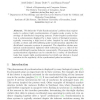Free Online Productivity Tools
i2Speak
i2Symbol
i2OCR
iTex2Img
iWeb2Print
iWeb2Shot
i2Type
iPdf2Split
iPdf2Merge
i2Bopomofo
i2Arabic
i2Style
i2Image
i2PDF
iLatex2Rtf
Sci2ools
CORR
2008
Springer
2008
Springer
Self-Stabilizing Pulse Synchronization Inspired by Biological Pacemaker Networks
We define the "Pulse Synchronization" problem that requires nodes to achieve tight synchronization of regular pulse events, in the settings of distributed computing systems. Pulse-coupled synchronization is a phenomenon displayed by a large variety of biological systems, typically overcoming a high level of noise. Inspired by such biological models, a robust and self-stabilizing pulse synchronization algorithm for distributed computer systems is presented. The algorithm attains near optimal synchronization tightness while tolerating up to a third of the nodes exhibiting Byzantine behavior concurrently. We propose that pulse synchronization algorithms can be suitable for a variety of distributed tasks that require tight synchronization but which can tolerate a bound variation in the regularity of the synchronized pulse invocations.
CORR 2008 | Education | Pulse Synchronization | Pulse Synchronization Algorithms | Synchronization |
| Added | 09 Dec 2010 |
| Updated | 09 Dec 2010 |
| Type | Journal |
| Year | 2008 |
| Where | CORR |
| Authors | Ariel Daliot, Danny Dolev, Hanna Parnas |
Comments (0)

